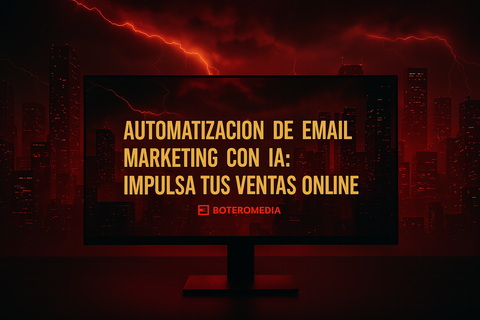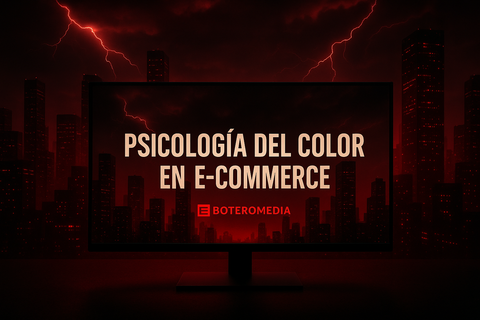In the competitive world of e-commerce, standing out and converting visitors into loyal customers is a constant challenge. While email marketing has long been a fundamental tool for online stores, inbox saturation and consumer demand for personalized experiences demand a smarter and more efficient approach (especially in markets like the United States, where a brand can send up to one or two emails per day) . This is where Email Marketing Automation with Artificial Intelligence (AI) revolutionizes the way e-commerce companies communicate with their audiences.
At BOTEROMEDIA, we're constantly facing this challenge, and after selling just over $8 million in 2024, these are our lessons learned, primarily through Omnisend's integration with Shopify.
It's not just about sending scheduled emails; it's about understanding each customer at a granular level, predicting their needs, and sending the perfect message, at the right time, with the most relevant content to drive action. AI takes automation to a new level, allowing online stores to scale their personalization and optimization efforts in ways that were previously impossible. However, you must know your target audience very well to better target them and increase their affinity with your brand.
In this article, we'll explore how AI is transforming e-commerce email marketing, its key applications, the benefits for your business, and how you can start implementing it to increase your sales and build stronger relationships with your customers.
What Does AI-Powered Email Marketing Automation Mean for Your E-Commerce?

Email marketing automation involves setting up email sequences that are automatically sent in response to specific triggers, such as a newsletter subscription, an abandoned cart, or a purchase. It's the backbone of scalable e-commerce communication.
Artificial intelligence comes into play to enhance this automation. Instead of rigid, predefined rules, AI allows email marketing campaigns to learn and adapt. It analyzes large volumes of customer behavioral data (purchase history, site navigation, interactions with previous emails) to:
- Segment your audience dynamically and predictively.
- Personalize email content (recommended products, offers, copies) on an individual level.
- Optimize shipping times for each user.
- Automate the creation and testing of campaign elements.
In essence, AI turns your automated email marketing campaigns into an intelligent communication system that continually improves itself, freeing up your team for more strategic tasks.
Why Does Your E-Commerce Need to Integrate AI into Its Email Marketing? The Tangible Benefits
Integrating AI into your email marketing strategy isn't just a trend; it's a must for e-commerce businesses looking to maximize their potential. The benefits are clear and translate directly into results:

- Significant ROI Increase: Email marketing is already known for its high return on investment, generating up to $36 for every dollar spent (ROAS of nearly 40), and up to $68 in US e-commerce. Automated campaigns, in particular, can generate a 320% higher ROI than non-automated ones, even when correlated with a launch, Black Friday, or major brand campaign. AI further enhances this, with optimizations that can lead to an additional ROI increase of up to 300% (Modalyst).
- Hyper-Relevant Personalization at Scale: AI goes beyond simply inserting a subscriber's name. It analyzes purchasing patterns, browsing history, and interactions to recommend the exact products that each person is likely to be interested in. This generates more accurate product recommendations, increasing click-through and conversion rates (Digital Authority).
- Greater Operational Efficiency: Tedious and repetitive tasks like manual segmentation, A/B testing, and initial copywriting can be automated or AI-assisted, saving your team valuable time (Design Rush). 71% of marketers report saving time thanks to AI automation ( Blaze.ai ).
- Key Metrics Improvement: AI-powered smart segmentation, personalization, and send-time optimization translate into higher open and click-through rates, and, most importantly, higher conversion rates (Fast Simon, LTV.ai ). AI-powered targeting can increase conversions by 28% (Digital Authority).
- Intelligent and Predictive Segmentation: AI can identify customer groups based on complex behaviors and predict future actions, enabling unprecedented precision segmentation for ultra-targeted campaigns (Digital Authority).
- Dynamic Send Time Optimization: AI learns when each individual is most likely to open your emails and schedules sends for those optimal times, increasing the visibility and engagement of your messages (omnisend)
Automated campaigns represent a small percentage of total email volume (around 2%) but generate a disproportionately large share of sales (up to 37% in e-commerce) (Omnisend). AI is the engine that maximizes the potential of these automations.
Key Applications of AI in Email Marketing Automation for E-commerce
AI can be applied to various stages and flows of your automated e-commerce email marketing strategy:

-
AI-Powered Welcome Flows: Beyond a simple informational sequence, AI can analyze a new subscriber's initial behavior on your site to personalize their first emails with relevant product recommendations or targeted content that aligns with their expressed interests.

- Intelligent Abandoned Cart Recovery: AI not only reminds customers about their cart, but can analyze purchase likelihood, cart value, and past behavior to determine whether to offer a personalized discount, suggest complementary products, or vary email copy to maximize conversions (MailerLite, Plivo).
- Personalized Post-Purchase Automations: After a purchase, AI can send follow-up emails that recommend related products (cross-selling or upselling) based on the purchased item and the customer's history, fostering loyalty and increasing Customer Lifetime Value (LTV) (Moosend).
- Inactive Customer Reactivation Campaigns: Using predictive analytics, AI can identify customers at risk of inactivity before they completely abandon their business and trigger reactivation campaigns with targeted offers or messages designed to recapture their attention (LTV.ai).
- Dynamic High-Value Customer Segmentation: AI can automatically identify your most valuable customers based on their purchase history, frequency, and value, allowing you to create exclusive loyalty programs or send them special offers that reinforce their loyalty.
- Dynamic Product Recommendations in Regular Newsletters: Even your mass newsletters can become hyper-personalized. AI can insert unique product recommendation blocks for each subscriber, based on their recent behavior or preferences, directly into the overall email content (Bloomreach - translated).
- AI-Assisted Content Creation: Some tools use AI to help generate catchy subject lines, email body copy variations, or even conversion-optimized call-to-action suggestions (ClickUp - translated, Brevo).
- Continuous A/B Testing and Automatic Optimization: AI can perform multivariate testing more efficiently, testing multiple elements (subject lines, images, calls to action) simultaneously and automatically directing traffic to the best-performing variants (ActiveCampaign).

How AI Drives Segmentation and Personalization in E-commerce
The key to effective email marketing in e-commerce is relevance. AI achieves this relevance through advanced segmentation and deep personalization. However, personalization starts from the very beginning, which is your e-commerce pop-up or footer. Here, you must be creative with AI to better segment your customers (surveys, quizzes, preferences, birthdays).

- Complex Data Analysis: AI processes a huge amount of data that a human couldn't handle efficiently: complete purchase history, products viewed, time on site, clicks on previous emails, demographic data, ad interactions, etc. (Blaze.ai).
- Advanced Behavioral Segmentation: Create segments based not only on who your customers are, but also on how they interact with your store. Examples: frequent buyers of a specific category, visitors who viewed high-priced products but didn't purchase, customers who engage most with emails about sales.
- Predictive Segmentation: AI can go a step further and predict future actions, such as the likelihood of a customer purchasing again, the likely timing of their next purchase, or the risk of churn. This allows for the creation of proactive segments for retention or upselling campaigns (LTV.ai).
- Individualized Dynamic Content: Based on segmentation and data analysis, AI personalizes elements within the email. This can include recommended product blocks specific to each user, offers or discounts that are more likely to resonate with them, or even variations in copy or images that are tailored to their interests (TryMaverick).
This ability to understand and anticipate customer needs at scale is what differentiates AI email marketing and makes it such a powerful tool for e-commerce growth.
Email Marketing Tools with AI Features for E-commerce
Numerous email marketing platforms are integrating AI features to enhance e-commerce strategies. When choosing a tool, consider its integration with your e-commerce platform (such as Shopify), its automation capabilities, and the AI features it offers. Some popular platforms with e-commerce-relevant features include (mentioned in the research):
- Omnisend: Specifically designed for e-commerce, with multi-channel automations that leverage AI for personalization and segmentation. (Our favorite at BOTEROMEDIA, in terms of price and quality)
- Klaviyo: A leading e-commerce platform with advanced AI-powered segmentation, automation, and predictive analytics.
- GetResponse: Offers email marketing and automation tools with AI features to generate content and optimize sending times.
- MailerLite: A popular platform that includes e-commerce automation and is increasingly incorporating AI-assisted features (MailerLite).
- Brevo (formerly Sendinblue): Offers automation and AI features for content and optimization.
-
ActiveCampaign: Known for its powerful automation and CRM capabilities that integrate AI for predictive analytics and optimization.
In addition to all-in-one platforms, there are specific AI tools focused on generating optimized copy (such as Phrasee/Jacquard, mentioned in some sources) or personalizing recommendations. The key is to find tools that integrate seamlessly with your e-commerce operations (Shopify - translated, GetResponse, EmailTooltester - translated, Structuring, Shopify - Tools) and that offer the AI features that will have the most impact on your sales flows.
Best Practices for Implementing AI in Your E-commerce Email Marketing Strategy
Adopting AI in your email marketing should be strategic:
- Define Your Goals Clearly: Do you want to reduce abandoned carts, increase LTV, improve open rates, or encourage repeat purchases? Your goals will guide your AI implementation, but even more importantly, you'll need to be clear about what you want to measure. Email is a fundamental tool for customer retention, but ABOVE ALL, for profitability.
- Ensure the Quality of Your Data: AI is only as good as the data it receives. Make sure your customer information is accurate and well-integrated with your email marketing platform. That's why it's essential to have an organized structure from the moment you acquire a lead or database, as well as the data that comes after that in terms of performance (CTR%, OPEN RATE%, PURCHASES, PURCHASE VALUE).
- Start with Key Automation Flows: You don't have to automate everything at once. Start with the most impactful flows for e-commerce, such as welcome and abandoned cart recovery, and introduce AI to optimize their performance. AI can also guide you on which automated emails are best for your type of business. (At BOTEROMEDIA, we have different flows for a technology brand, a supplement brand, and a toy brand. A customer who needs to buy collagen monthly is NOT the same as a customer who wants to buy toys for their children.)
- Monitor and Analyze Performance: AI optimizes, but you need to monitor the results. Use reports to understand what's working and where adjustments can be made (even if the AI is suggesting optimizations). AI can not only help you read reports, but it can also help you draw conclusions about your email design, colors, buttons, and CTAs. Always remember to take a screenshot of the file and run it through chatgpt to review this information.
- Maintain Your Brand Voice: If you use AI to generate copy, review it to ensure it aligns with your brand personality. AI is an assistive tool, not a complete replacement for human creativity. In the end, AI saves you 80% of the work, but you make the difference...
- Prioritize Integration: Choose AI-powered email marketing tools that integrate natively and seamlessly with your e-commerce platform (like Shopify) to ensure customer behavior data syncs properly (Shopify Apps - Conversa).
-
Test Constantly: While AI can automate testing, it's still important to experiment with different approaches and messages to discover new opportunities for improvement.
Challenges and Considerations
- Data Privacy: Ensure you comply with data protection regulations (GDPR, etc.) when collecting and using customer data for AI personalization. This varies by country. For us at BOTEROMEDIA, the biggest challenge has been in Europe, where they are very strict with the legislation.
- Learning Curve: The most advanced AI tools can take time to configure and fully understand their capabilities. "The learning curve also extends to the entire email process. Our motto is to give it 90 days before making a decision."
- Maintain Authenticity: It's crucial that automated emails, even with AI, continue to sound like your brand and not like generic or cold communications.
The Future of AI in Email Marketing for E-commerce
The future is bright. We can expect AI to become even more sophisticated in predicting customer behavior, generating highly personalized content (including dynamic visuals), and fully automating campaign optimization. AI will enable e-commerce companies to offer near one-to-one shopping experiences on a massive scale.
Conclusion
AI-powered email marketing automation is no longer a luxury, but a necessity for e-commerce businesses looking to grow efficiently and profitably. It allows you to move from mass mailings to personalized conversations, optimizing every customer interaction to maximize sales and loyalty. Remember that your business is worth the positive cash flow it generates, and you can achieve this by improving your own acquisition channels, such as email marketing, but also by improving your organic channels (SEO, Social Media). Carlos Andres Botero "Author of this article"
By leveraging AI for intelligent segmentation, dynamic personalization, and optimization of automated flows like abandoned carts and post-purchase, online stores can achieve significantly higher ROI, save time, and deliver the relevant experience customers expect today.
Finally, it's essential to understand that AI allows us to conceptualize, develop, implement, and analyze email marketing strategies, which is why it's imperative that you start, even if it's just with Chatgpt and Shopify email.
If you haven't yet explored how AI can transform your e-commerce email marketing strategy, now is the time to consider the tools and tactics that will allow you to take your results to the next level.
Sources Cited
- https://www.mailerlite.com/blog/ecommerce-email-marketing-automation
- https://clickup.com/en-US/blog/127034/ai-email-marketing-tools
- https://www.activecampaign.com/blog/ai-email-marketing
- https://www.getresponse.com/blog/ia-in-email-marketing
- https://apps.shopify.com/conversa?locale=es
- https://translate.google.com/translate?u=https://www.trymaverick.com/blog-posts/best-generative-ai-tools-and-shopify-apps-for-personalized-email-marketing-campaigns&hl=es&sl=en&tl=es&client=srp
- https://translate.google.com/translate?u=https://www.emailtooltester.com/en/blog/best-email-marketing-for-shopify/&hl=es&sl=en&tl=es&client=srp
- https://blog.estructurando.com/artificial-intelligence-tools-you-can-use-with-shopify
- https://www.shopify.com/blog/12-online-marketing-tools-to-grow-at-the-speed-of-light
- https://www.getresponse.com/solutions/ecommerce-marketing/shopify
- https://www.brevo.com/blog/ia-marketing-tools/
- https://www.cyberclick.es/numerical-blog/las-mejores-herramientas-de-ai-para-
- https://moosend.com/blog/ecommerce-email-marketing-automation/
---
Frequently Asked Questions about AI in Email Marketing for E-commerce
Is AI only for large e-commerce sites with huge databases?
Not necessarily. While AI benefits from large volumes of data, many email marketing platforms with AI capabilities are designed for e-commerce sites of all sizes, including Shopify stores. Features like send time optimization or AI-powered subject line generation can be useful even with smaller databases.
Do I need to be a tech expert to use AI in my email marketing?
Most modern AI email marketing tools are designed to be intuitive for marketers. You don't need advanced programming or data science skills. The platform does the heavy lifting of analysis and optimization, presenting recommendations or results to you in a clear way.
Can AI completely replace an email marketer?
No. AI is a powerful tool that automates and optimizes tasks, but strategy, creativity, brand oversight, and interpreting results to make informed decisions remain crucial roles for marketers. AI enhances the specialist, not replaces them.
What's the first step to start using AI in my email marketing?
The first step is to assess your current needs and the challenges you face in your email marketing (e.g., low open rates, persistent abandoned carts). Then, research email marketing platforms that offer e-commerce-specific AI features that address those challenges and integrate well with your store (if you use Shopify, look for native integrations). Start by implementing AI in one or two key automation flows, such as your welcome sequence or cart recovery.




